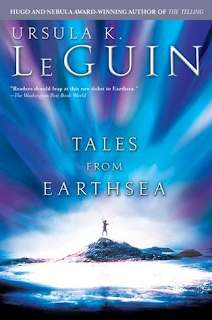Tales from Earthsea by Ursula K. Le Guin
Hello, Stranger.
Primary Driver: (Plot, World, or Character)
Bechdel Test: Pass.
Review: Does for Earthsea what the Silmarillion does for Middle Earth, but does not require the same level of buy in. Mileage may vary for each story. Le Guin successfully creates short, compelling vignettes, which illuminate aspects of her world - without sacrificing character or plot. Nice to see Ged doing his thing again. Probably my favorite of the post-trilogy Earthsea books.
The way one does research into nonexistent history is to tell the story and find out what happened. I believe this isn’t very different from what historians of the so-called real world do. Even if we are present at some historic event, do we comprehend it-can we even remember it-until we can tell it as a story? And for events in times or places outside our own experience, we have nothing to go on but the stories other people tell us. Past events exist, after all, only in memory, which is a form of imagination. The event is real now, but once it’s then, its continuing reality is entirely up to us, dependent on our energy and honesty. If we let it drop from memory, only imagination can restore the least glimmer of it.
What a fascinating way to kick off a foreword. We are here to witness events which are made more or less real by how compellingly they are told, to experience a past in such a way that we believe it. In some ways this is even more challenging for fiction writers than for historians: when a historian recounts an unlikely event, they are able to do so without suspicion, because they are telling of a thing that, no matter how improbable, occurred. An author is liable to be stung by the slings and arrows of commenters, accusations of "convenience" and "messiness" flying about. Real history is rarely all that reasonable: it is only fictional history that must be neat and clean.
With all this in mind, The Other Wind is a masterpiece. Le Guin tells stories that belong in Earthsea as much as Ged's trilogy. That we did not yet know of these events feels like a failure on behalf of the reader for not doing their homework; the same feeling of internal chagrin that one gets when called out on not knowing about a well-known point in history. "How could I not have known this?" Simply put, these stories fit so comfortably into the canon of Earthsea that I would have believed this to be written first, or that they were earlier notes finally put into the format of full stories. It is astounding that these are retroactively constructed background. It's like she's a professional author or something.
The stories here span many hundreds of years. Each one is written to do one or both of the following: filling in a gap in the past to explain the present; or fleshing out a character with whom we have already been acquainted. Whether the focus is world building or character construction, each story succeeds admirably. There is a logical flow to each story, both internal and woven into the broader tapestry of Earthsea. Plots are... present. Some more interesting than others. But these stories are more about the journey than the destination. They shed light on the world and those within it, and are written - as Le Guin always do her do - with absolutely compelling style.
My favorite two stories are "The Bones of the Earth" and "On the High Marsh" - but this is very clearly a matter of personal taste.
This would be worth a read even if you did not want to read Tehanu or The Other Wind.
If you want to give these tales a telling, consider using the link below! I'll get a few cents at no extra cost to you.

Comments
Post a Comment